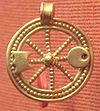In Gallo-Roman religion, Damona was a goddess worshipped in Gaul as the consort of Apollo Borvo and of Apollo Moritasgus.
Name
The theonym Damona is a derivative of the Proto-Celtic stem *damo-, meaning 'bull' or 'deer' (cf. Old Irish dam 'bull, deer'; also *damato- > Middle Welsh dafad 'sheep', Old Cornish dauat 'ewe'), itself from Proto-Indo-European *dmh2o- ('the tamed one'). The Latin noun damma, which is the source of French daim ('roe'), is probably a loanword from Gaulish. The root *dmh2- is also presumably reflected in the British tribal name Demetae, interpreted as meaning 'Tamers'.
Cult

Damona and Bormana have been described as the patron deities of the hot springs at Bourbonne-les-Bains and Saint-Vulbas, respectively. Some seventeen inscriptions dedicated to Damona have been recovered, including nine from Bourbonne-les-Bains and four from Bourbon-Lancy, both spa towns in eastern France. In one inscription from Saintes, she has the epithet Matubergini.
Inscriptions and dedications
There are several inscriptions relating to Damona, including two inscriptions in Bourbon-Lancy (CIL 13, 02805), discovered in 1792.
- C (aius) Iulius Eporedirigis f (ilius) Magnus / pro L (ucio) Iulio Caleno filio / Bormoni and Damonae / vot (um) sol (vit)
and (CIL 13, 02806), where Damona is also included in dedications to Borvo, (CIL 13, 02807) and (CIL 13, 02808):
- Borvoni and Damonae / T (itus) Severius Mo / destus mnib (us) / h n and offi
The other large site associated with Damona is Bourbonne-les-Bains, there are nine dedications to the goddess of the waters, including (CIL 13, 05911):
- Deo Apol / lini Borvoni / et Damonae / C (aius) Daminius / Ferox civis / Lingonus ex / voto
and (CIL 13, 05914):
- Borvoni / and Damon (ae) / Aemilia / Sex (ti) fil (ia) / M S
with (CIL 13, 05921):
- Damonae Aug (ustae) / Claudia Mossia and C (aius) Iul (ius) Superstes fil (ius) / l (ocus) d (atus) ex d (ecreto) d (ecurionum) v (otum) s (olverunt) l ( ibentes) m (erito)
Damona also appears in dedications to Chassenay, associated with Albius and Alise-Sainte-Reine. An inscription was found bearing Damona's name in Alesia in 1962, where she was worshipped with Apollo Moritasgus (CIL 13, 11233):
- Aug (usto) sacr (um) / deo Albio and Damonae Sex (tus) Mart (ius) / Cocillus ex iussu eius v (otum) s (olvit) l (ibens) m (erito)
and (CAG-21-01):
- Deo Apollini Moritasgo / Damonae P (ublius) Pontius Apolli
Finally, there is an inscription in Rivières.
Jullia Malla Malluronis fîl (ia) numinibus Augustorum et deae Damonae Matuherginni (?) Ob memoriam Sulpiciae Silvanae filiae suae de suo posuit
References
- Delamarre 2003, p. 135.
- Matasović 2009, p. 89.
- MacKillop, James (2016). A dictionary of Celtic mythology. Oxford. ISBN 978-0-19-880484-0. OCLC 965737514.
{{cite book}}: CS1 maint: location missing publisher (link) - William van Andringa (2002). La religion en Gaule romaine : Piété et politique (I-III siècle apr. J.-C.) Editions Errance, Paris. p.165
- Nicole Jufer & Thierry Luginbühl (2001). Les dieux gaulois : répertoire des noms de divinités celtiques connus par l'épigraphie, les textes antiques et la toponymie. Editions Errance, Paris. pp.36-7.
- Hatt, Jean-Jacques (1983). "Apollon guérisseur en Gaule. Ses origines, son caractère, les divinités qui lui sont associées - Chapitre II". Revue archéologique du Centre de la France. 22 (3): 185–218. doi:10.3406/racf.1983.2383.
- Le Gall, Joël. (1980). Alésia : archéologie et histoire (Nouv. éd. rev. et augm ed.). : Fayard. ISBN 2-213-00780-2. OCLC 7462836.
- Raepsaet-Charlier, Marie-Thérèse (2013). "Alésia et ses dieux:: du culte d'Apollon Moritasgos à l'appartenance civique des Mandubiens à l'époque gallo-romaine". L'Antiquité Classique. 82: 165–194. doi:10.3406/antiq.2013.3831. ISSN 0770-2817. JSTOR 90004373.
- Beck, Noémie (2009). Goddesses in Celtic Religion: Cult and Mythology: A Comparative Study of Ancient Ireland, Britain and Gaul. Lyon, France.
{{cite book}}: CS1 maint: location missing publisher (link) - Héron de Villefosse, Antoine (1918). "Inscription romaine de Rivières (Charente)". Comptes rendus des séances de l'Académie des Inscriptions et Belles-Lettres. 62 (6): 479–484. doi:10.3406/crai.1918.74083.
Bibliography
- Delamarre, Xavier (2003). Dictionnaire de la langue gauloise: Une approche linguistique du vieux-celtique continental. Errance. ISBN 9782877723695.
- Matasović, Ranko (2009). Etymological Dictionary of Proto-Celtic. Brill. ISBN 9789004173361.
| Celtic mythology series | ||
|---|---|---|
| Ancient deities of Gaul, Britain and Gallaecia by region | ||
| Supra-regional |
|   |
| Britannia | ||
| Gallia Aquitania | ||
| Gallia Belgica | ||
| Gallia Celtica | ||
| Gallia Cisalpina | ||
| Gallia Narbonensis | ||
| Germania Inferior | ||
| Gallaecia | ||
This article relating to a Celtic myth or legend is a stub. You can help Misplaced Pages by expanding it. |
 | This article about a deity is a stub. You can help Misplaced Pages by expanding it. |